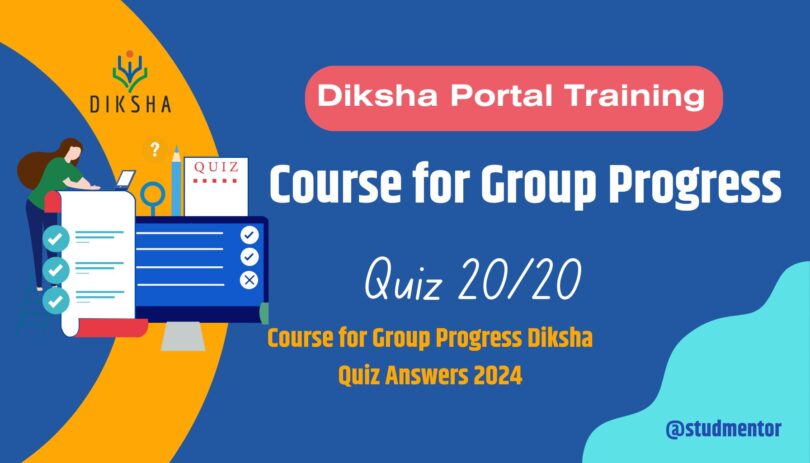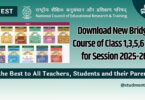Are you searching for – Course for Group Progress Diksha Quiz Answers 2024
Then you are at Right Place.
The Complete and Official Information of Course for Group Progress Diksha Quiz Answers 2024
Course for Group Progress Diksha Quiz Answers 2024
Welcome to the Diksha Quiz for improving the quality of Education in the all the CPD Training.
Certification
At the end of the course, learners are expected to take up an objective assessment quiz. Learners who acquire 70% in the final assessment will receive an online ‘Certificate of Participation’ in the DIKSHA portal.
Let’s Start Answer Key for Course for Group Progress Diksha Quiz Answers 2024 | Diksha New Course
Course for Group Progress Diksha Quiz Answers 2024
1. FLN Mission is a national initiative for proficiency in __________________
Answer – Reading with understanding and numeracy
2. Foundational Literacy and Numeracy refers to building adequate _________ during the foundational stage of school education.
Answer – Literacy and numeracy skills
3. The ability to ______, and perform basic operations with numbers, is a necessary foundation and an indispensable prerequisite for all future schooling and lifelong learning (NEP 2020)
Answer – Read and Write
4. The vision of the FLN Mission is to create an enabling environment in all aspects to ensure __________in primary classes by 2025 so that every child achieves the desired learning competencies in reading, writing and numeracy at the end of Class III and not later than Class V.
Answer – Universal acquisition of FLN
5. The national FLN Mission is an important step towards ensuring that by __________, our children attain skills of reading with meaning and basic mathematical and numeracy skills.
Answer – Class III
6. Target 4.2 of the SDG, aims to ensure that all girls and boys including those belonging to disadvantaged groups and with disability, health conditions have access to quality ____ care and pre-primary education by 2030 so that they are ready for primary education
Answer – Early childhood development
7. ECCE in our country is delivered through ___________institutions, consisting of (a) stand – alone anganwadis; (b) anganwadis co-located with primary schools; (c) pre-primary schools/sections covering at least age five to six years co-located with existing primary schools; and (d) stand alone pre-schools as mentioned in NEP – 2020
Answer – Early childhood eduction
8. ECCE is period from ____________
Answer – Birth to eight years of age
9. The Full form of ECCE is
Answer – Early Childhood Care and Education
10. NEP 2020 proposes ________of Anganwadi/preschool/Balvatika for three to six years age group before Class I.
Answer – Three years.
11. States and UTs have a critical role to play to achieve the goal of FLN in a _________mode.
Answer – Mission
12. In the government, ECCE is mainly provided through Integrated Child Development Services (ICDS) centres known as ___________
Answer – Anganwadis
13. Efforts will be made to ____________government primary school teachers and develop material like e-content, including lesson plans, use of innovative pedagogies, etc. to support teachers teaching at the primary level.
Answer – Mentor
14. The ECCE training of Anganwadi workers/teachers will be ____________by the Cluster Resource Centres of the School Education Department.
Answer – Mentored.
15. Pre-school education ensures a _________from preschool to early primary classes leading to better performance and better retention rates.
Answer – Smooth transition
16. Who has provided the guidelines of FLN Mission ?
Answer – MoE
17. Early years are ‘critical’ in any child’s life span since the _________is more rapid than at any other stage of development.
Answer – Rate of development
18. Engage all stakeholders that is, teachers, parents, students and the community for building a strong foundation of
Answer – Lifelong learning
19. NCERT will be providing__________ to states and UTs in the fulfillment of FLN Mission objectives.
Answer – Academic support
20. Focus of foundational learning is ________________
Answer – On holistic development of the child.
21. The department of school education will provide __________ to teachers in the achievement of learning outcome, quality for student engagement, retention and academic achievement for Classes I to V.
Answer – Academic support
22. Schools will work for the attainment of _________ in a mission mode according to FLN Mission guidelines.
Answer – Foundational Literacy and Numeracy skills
23. Early childhood education has been included as a specific target in the context of ___________
Answer – Sustainable Development Goal (SDG)
24. The vision of the mission is that every child achieves the desired learning competencies in reading, writing and numeracy at the end of ________-
Answer – Class III and not later than Class V
25. Role of States and UTs will be to __________________
Answer – Make the action plan to achieve the targets.
Thanks to Beloved Readers.




